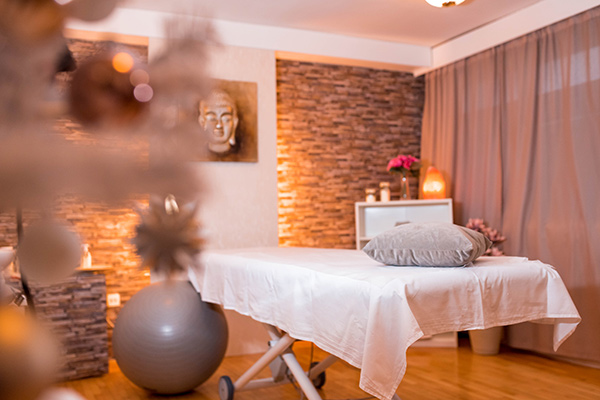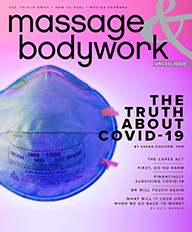
Be sure to read the special COVID-19 digital-only issue of Massage & Bodywork magazine.
There has been quite a bit of wailing and gnashing in the massage therapy profession as the ripple—and even tidal wave—of COVID-19 is forcing us to ask questions about who we are and why it matters. As Pema Chodron says, “This moment is the perfect teacher.”
As massage therapists, we miss our clients, which causes us to anxiously ask, “How can I be of service if I can’t touch?” And, of course, “When will it all go back to normal?” The short answer? It won’t, actually.
Let me be the eleven-millionth person to say, “We will never go back to the way it was before.” Post-coronavirus may begin to feel normal, but there will be a new normal—the likes of which we have never known.
Yes, things will change, but you may be relieved to know that’s not what I want to talk about. I want to discuss why it matters so much that we are not able to be out there doing our work at this time, especially when we know that touch and connection could be a crucial antidote to the stress and uncertainty of COVID-19.
Touch is Essential
It is hard for massage therapists to be “hands-off.” We say that our hands ache to touch people. We say that we want to use our hands. We say that we want to cut our fingernails and be ready to touch. And we do want to do these things, but that’s not why we’re all in a dither.
Countless studies, dating back even before Harlow’s monkey experiments,1 show that touch deprivation can be incredibly detrimental to our health—even sometimes leading to death in touch-deprived infants. Long before any of us read Ashley Montagu’s work2 exploring the “significance of the skin,” we just knew this. Newspapers tell the story of isolation in the geriatric community and about how much they need to be touched. We hold hands with each other, rub shoulders, hug, and just lean into each other.
From a young age, we see, feel, and understand that touch is essential. Whether the touch we experience is good or bad, there is no question about its effect on who we are and how we connect with the world around us.
“Nonessential” Is Not a Value Judgment
As massage therapists, our brains break when we try to fathom the reality that touch is not essential, but in the face of a highly contagious global pandemic, we have to check the box that says “nonessential.” Resist the temptation to take the “nonessential” label as a value judgment. The power of touch to engage and support our life force is undisputed, but so is the ability of direct contact to spread coronavirus.
So, it’s not about you. When we understand that this period of physical distance and non-touching is bigger than our personal and professional livelihood or our identity—or the livelihoods and identities of the people who work with us—the weight lifts. Having a broader perspective makes it more about the suffering of the whole world that needs to be touched rather than a loss that is uniquely tragic for MTs who touch for a living. That whole world includes all of us.
One Day at a Time
We don’t know how long we’ll have to stand down, but even a day can feel overwhelming because we know in our bones that humans need touch. All humans. Massage therapists are not uniquely qualified to provide touch that is more powerful than a hand on a shoulder or a caress of the cheek. Nevertheless, as massage therapists, we believe so deeply in touch that we’ve made it our life’s work. As a result, we made touch something that opens the door for us to feel that we are somehow suffering more than people who don’t touch for a living. But, we’re missing something when we chalk up our sense of loss entirely to physical contact.
We are grieving the loss of physical touch, but we are also grieving the thing that really makes massage therapy something that matters: relationship. Our clients’ hamstrings, lymphedema, plastic surgery scars, ALS, and everything else they say brings them to us are definitely going to miss our hands as we heed the wise advice to stay home and away from these people we have come to love touching.
Now is a great time to broaden our perspective and begin to notice how much of what we do is not about our hands; the thing that makes us unique is that we create a space. We create spaces in our treatment rooms, in infusion centers, at the bedside of hospital patients. We create space, not with our hands but with our listening, with our questions, and with our interest in the lives and well-being of other people. We are mistaking our inability to share physical space with our ability to create sacred space. So, keep your hearts open and keep connecting.
You can still ask. You can still listen. And, most of all, you can still care.
We will touch again. It will be different, but it will happen. When it does, I hope you will have used this time to become exponentially more familiar with the whole of human suffering so you can bring renewed tenderness and connection to the space you create with your clients.
Our new reality as MTs is not knowable from here. But don’t let the unknown frighten you. “Not knowing” just simply means our new reality is yet to come.
Notes
1. Harry F. Harlow, “The Nature of Love,” American Psychologist 13 (1958): 673–85, https://psychclassics.yorku.ca/Harlow/love.htm.
2. Marshall F. Gilula, “Touching: The Human Significance of the Skin,” The Journal of the American Medical Association 218, no. 5 (November 1971): 744–45, https://doi.org/10.1001/jama.1971.03190180064042.
This article also appeared in the special COVID-19 issue of Massage & Bodywork.
Cal Cates is an educator, writer, and speaker on topics ranging from massage therapy in the hospital setting to end of life and massage therapy policy and regulation. A founding director of the Society for Oncology Massage from 2007–2014 and current executive director and founder of Healwell, Cates works within and beyond the massage therapy community to elevate the level of practice and integration of massage overall and in health care specifically.